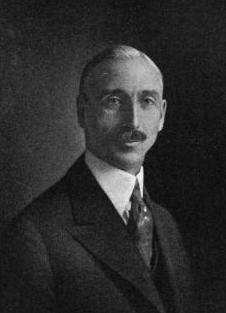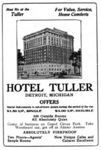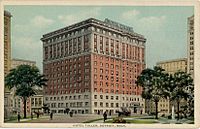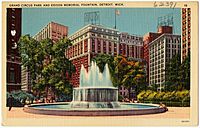Hotel Tuller facts for kids
Quick facts for kids Hotel Tuller |
|
|---|---|
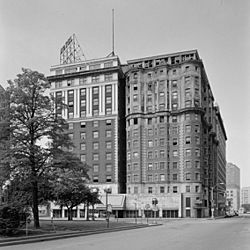
Hotel Tuller, c. 1992
|
|
| General information | |
| Status | Demolished |
| Type | Hotel |
| Location | Adams Avenue West, Bagley Street, and Park Avenue Detroit, Michigan |
| Coordinates | 42°20′10″N 83°03′08″W / 42.3361°N 83.0522°W |
| Completed | 1906, 1910 (first addition), 1914 (second add.), 1923 (third add.) |
| Demolished | 1991 |
| Technical details | |
| Floor count | 14 |
| Design and construction | |
| Architect | William H. Adams (third addition) |
|
Hotel Tuller
|
|
|
U.S. Historic district
Contributing property |
|
| Part of | Grand Circus Park Historic District (ID83000894) |
| Designated CP | February 28, 1983 |
The Hotel Tuller was once a very famous and fancy hotel in downtown Detroit, Michigan. It stood across from Grand Circus Park, a well-known area in the city. The Hotel Tuller was one of the biggest luxury hotels in Detroit and the first of its kind in the Grand Circus Park area. People often called it the "grand dame of Grand Circus Park," which means it was a very important and beautiful old building. Today, a parking lot stands where the hotel used to be, right next to the United Artists Theatre Building.
A famous composer named Gerald Marks had his band, the Gerald Marks's Hotel Tuller Orchestra, based at the hotel. This band made many popular songs that were recorded for Columbia Records in the mid-1920s.
Contents
History of the Hotel Tuller
The Hotel Tuller was first built in 1906 by a man named Lew Whiting Tuller. When it first opened, the hotel had nine floors. Just four years later, in 1910, five more floors were added to the building.
Growing Bigger and More Popular
In 1914, a large addition was built next to the original hotel. This new part had fourteen stories and became a very popular spot for big meetings and special dinners. The hotel grew even larger in 1923 when a final section was added. This made the hotel huge, with 800 rooms, and every single room had its own private bathroom. The hotel also had a very large room called the Arabian Room, which was the biggest ballroom in Detroit. It could hold up to 600 people for events!
Challenges and Changes
By the early 1920s, the Hotel Tuller faced tough competition from other new and grand hotels in Detroit, like the Statler Hotel and the Book-Cadillac Hotel. Because of this, the Tuller went through some financial trouble and declared bankruptcy in 1927. There was a plan in 1928 to tear down the hotel and build an even bigger one with 35 stories, but this idea was stopped because of the Great Depression, a time when the economy was very bad.
In 1944, new owners bought the Hotel Tuller and gave it a complete new look. The main lobby was redesigned by a famous architectural company. Sadly, in 1959, a fire broke out at the hotel, and three people lost their lives.
The End of an Era
Over time, the hotel became old and run-down. It was used as a place for people to stay for a long time at a low cost. Finally, in 1976, the Hotel Tuller closed its doors for good. The city of Detroit decided that the building was too damaged to fix. So, in 1991, the grand Hotel Tuller was torn down. Since then, the spot where it once stood has been a parking lot.
About Lew Tuller
Lew Whiting Tuller was born in Jonesville, Michigan, in 1869. His father was an architect and builder, which means he designed and constructed buildings. Lew followed in his father's footsteps and joined the family business after finishing school.
Building a Hotel Empire
In 1894, Lew Tuller moved to Detroit. There, he built many apartment buildings and other structures. In 1906, he built the large hotel that was named after him, the Hotel Tuller. At first, he couldn't find anyone to rent the building, so he decided to run it as a hotel himself. This turned out to be a very successful idea! Because the Hotel Tuller did so well, he went on to build three more hotels in Detroit: the Eddystone, the Park Avenue, and the Royal Palm.
Financial Struggles and Later Life
However, as more hotels were built in Detroit, the competition became very strong. Also, the late 1920s brought financial problems for many people and businesses. Lew Tuller also made some real estate deals that didn't work out well. Because of these challenges, he started to lose his hotel empire. The Eddystone and Royal Palm Hotels were taken over by banks in 1928. Lew Tuller even tried to hide himself to prevent the Hotel Tuller from being taken over too.
Lew Tuller lived to be 88 years old and passed away in Pontiac, Michigan, in 1957.
Gallery
See also
 In Spanish: Hotel Tuller para niños
In Spanish: Hotel Tuller para niños
 | James Van Der Zee |
 | Alma Thomas |
 | Ellis Wilson |
 | Margaret Taylor-Burroughs |


